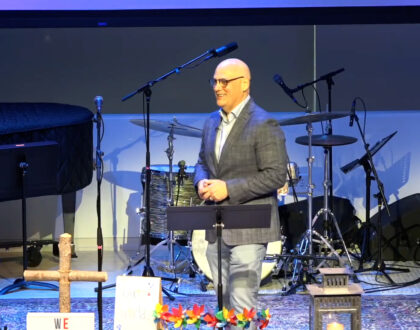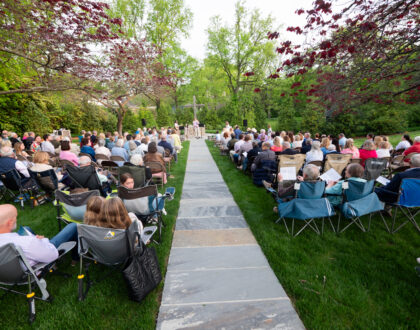Celebrating Woodmont’s 81st Birthday

This Sunday, Woodmont will celebrate its 81st birthday (we just lost our oldest member – Terry Cheek who was 99 years old). Our church was “planted” in the summer of 1943, during World War II, by members of Vine St. Christian Church when it was located downtown. Woodmont has certainly grown, changed, and evolved throughout its history. The religious landscape in America is certainly very different than it was when Woodmont first opened its doors.
We now find ourselves living in an age where many consider themselves “spiritual but not religious.” I hear this all the time in conversations that I have. It sounds something like this: “Well, we are members of X Church but we never go.” This trend has continued to grow in American culture in recent years.
According to the most recent PEW Research, less than half of Americans now claim church membership. Thirty-two percent of Americans say they attend church on a semi-regular basis. Attending church once a month is viewed as regular attendance. How can we explain these trends?
There are many reasons why people feel this way: church is boring; they’ve been hurt or damaged by organized religion; there’s a clear disconnect between Jesus’ values and those who claim to follow him; there are alternative ways to find community; there is a lack of trust in religious institutions; people now use the church to push a specific political agenda – either right or left rather than creating a culture where people can civilly discuss their differences. It is common knowledge now that the fastest growing religious group in recent years are the “nones” – those not affiliated with any faith tradition. Many of the “nones” consider themselves spiritual and hungry for community. Morality and decency are still very important to many. Yet many keep pointing out the clear disconnect between Jesus and the way Christians often behave.
In a book I have referred to often called The Future of Faith, theologian Harvey Cox says that Christianity is drastically changing. Interestingly enough, he identifies three basic eras in the history of Christianity. The first era he calls the AGE OF FAITH. This was from the time of Jesus until the rule of Emperor Constantine in the fourth century. In this age, he says that the church was more concerned with following Jesus’ teachings than enforcing what to believe about Jesus.
The second era he calls the AGE OF BELIEF. This era began when Emperor Constantine made Christianity the official religion of the Roman Empire in the fourth century. It spread drastically and quickly. In this era, the church focused on orthodoxy, correct doctrine, and asked the question, “What are we supposed to believe about Christ?”
We have now entered the third and final era, according to Cox, and it is called the AGE OF THE SPIRIT. It began back in the 1960s and in it, doctrine and creeds are not nearly as important as breaking down barriers between religions and denominations. Now, denominational loyalty is not what it used to be. Cox says that in this era, spirituality is replacing formal religion and actually experiencing the divine is much more important than holding correct beliefs or quoting scripture. Cox says that spirituality can mean many different things. It is the rejection of pre-packaged theological propositions. It is an attempt to voice the awe and wonder of creation and life and how that can not just be limited to within the church walls. And spirituality realizes that we have a lot to learn from both inter and intra-religious dialogue, learning from other religions and learning from other Christians.
Many will panic and ask, “What does this mean for the future of the Church?” That’s a very important question that is being studied by many experts. It means that the church must be intentional about helping the younger generations grow in their spiritual lives and not get too bogged down with the baggage that organized religion often carries. What matters most – growing spiritually, radical hospitality, authentic connection, small groups, mission, outreach, sacrifice, relationships, humility, changing lives, a living relationship with Christ, and the experience of authentic community. What doesn’t matter as much – denominational loyalty, creeds, hierarchy, fighting over social issues, non-functioning committees, church politics, and ecclesial hierarchies that don’t make any sense. Young believers today are looking for a faith that is authentic and transformational, life changing, and relevant to their lives. Young Christians can also snuff out pretentiousness and a false sense of piety. Faith communities that seek to grow and remain vibrant in the 21st century should take note because according to Cox, the age of the spirit is continuing to unfold. Spiritual growth is very important, but churches must ensure that there is a process for spiritual formation to take shape. Eighty-one years later, Woodmont continues seeking to do just that.
Recommended Posts

New Series – “Timeless Values for a Chaotic World”
May 05, 2025

“The Five Most Important Things Youth Ministry Can Teach All of Us” – Jay Hutchens – May 4, 2025
May 04, 2025

An Easter Mindset & How We See the World
April 30, 2025

